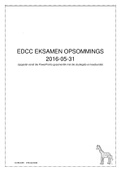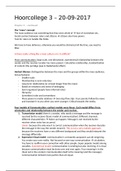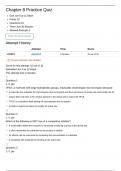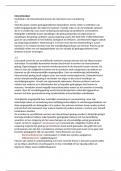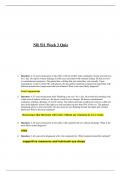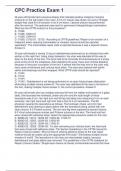MACBETH
Major Themes
Prophecy
The plot of Macbeth is set in motion ostensibly by the prophecy of the three witches. The
prophecy fans the flames of ambition within Macbeth and Lady Macbeth, serving as the
primary impetus for the couple to plot the death of Duncan--and subsequently Banquo.
But one also wonders: Would Macbeth have committed such heinous crimes if not for the
prophecy? What if he had ignored the witches’ statements? Such speculation, however
interesting, ultimately appears futile, since the prophecy itself is self-fulfilling. The
witches know Macbeth’s tragic flaw: given the irresistible temptation to become King, he
will choose to commit murder even though he could simply discard their words. As it
turns out, the prophecies are not only fated but fatal, as Macbeth's confidence in the
witches leads him to fight a rash battle in the final act.
Guilt and Remorse
Some of the most famous and poetic lines from Macbeth are expressions of remorse.
“Will all great Neptune’s ocean wash this blood / Clean from my hand?” exclaims
Macbeth after he stabs Duncan (II ii 58-59). Similarly, Lady Macbeth is plagued by a
“spot” that she cannot remove from her hand: “Out, damned spot! Out, I say. . . What,
will these hands ne’er be clean?” (V I 30-37). At first physical remainders of a
regrettable crime, the royal blood leaves permanent marks on the psyche of the couple,
forever staining them with guilt and remorse. The different ways in which the Macbeths
cope with their crimes show how their characters develop: whereas Lady Macbeth is
initially the one without scruples, urging Macbeth to take action, it is an overpowering
sense of guilt and remorse that drives the Lady to her untimely death. Macbeth, on the
other hand, seems to overcome the guilt that plagues him early on in the play.
Ghosts and Visions
Just as an overwhelming guilty conscience drives Lady Macbeth mad, so too does
Macbeth’s “heat-oppressed” brain project the vision of a dagger before he murders
Duncan (II i 39). In what concerns ghosts and visions, the relation of the natural to the
supernatural in Macbeth is unclear. The three apparitions that the witches summon, for
example, are usually taken to be “real”—even if only as supernatural occurrences. But
the matter is less clear when it comes to Banquo’ ghost. Macbeth is the only one who
sees the ghost in a crowded room; is this yet another projection of his feverish mind? Or
is it really, so to speak, a supernatural occurrence? Such ambiguities contribute to the
eerie mood and sense of uncanniness that pervade the play, from the very opening
scene with the three bearded witches.
The Natural/Supernatural
If the witches’ prophecy is understood to be imposing a supernatural order on the
natural order of things, the natural order can also be understood as responding with
tempestuous signs. Following Duncan’s death, Lennox describes the “unruly” night in
some detail. Similarly, Ross notes that “the heavens, as troubled with man’s act, /
Threatens his bloody stage” (II iv 5-6). In the same scene, the Old Man and Ross both
agree that they saw horses eat each other. Even the events leading to the conclusion of
the play can be understood as a negotiation of the natural and supernatural. Whereas
Macbeth believes that he will live the “lease of nature”—since Birnam Wood cannot
possible come to Dunsinane Hill—the forest is literally uprooted by the English army in
Major Themes
Prophecy
The plot of Macbeth is set in motion ostensibly by the prophecy of the three witches. The
prophecy fans the flames of ambition within Macbeth and Lady Macbeth, serving as the
primary impetus for the couple to plot the death of Duncan--and subsequently Banquo.
But one also wonders: Would Macbeth have committed such heinous crimes if not for the
prophecy? What if he had ignored the witches’ statements? Such speculation, however
interesting, ultimately appears futile, since the prophecy itself is self-fulfilling. The
witches know Macbeth’s tragic flaw: given the irresistible temptation to become King, he
will choose to commit murder even though he could simply discard their words. As it
turns out, the prophecies are not only fated but fatal, as Macbeth's confidence in the
witches leads him to fight a rash battle in the final act.
Guilt and Remorse
Some of the most famous and poetic lines from Macbeth are expressions of remorse.
“Will all great Neptune’s ocean wash this blood / Clean from my hand?” exclaims
Macbeth after he stabs Duncan (II ii 58-59). Similarly, Lady Macbeth is plagued by a
“spot” that she cannot remove from her hand: “Out, damned spot! Out, I say. . . What,
will these hands ne’er be clean?” (V I 30-37). At first physical remainders of a
regrettable crime, the royal blood leaves permanent marks on the psyche of the couple,
forever staining them with guilt and remorse. The different ways in which the Macbeths
cope with their crimes show how their characters develop: whereas Lady Macbeth is
initially the one without scruples, urging Macbeth to take action, it is an overpowering
sense of guilt and remorse that drives the Lady to her untimely death. Macbeth, on the
other hand, seems to overcome the guilt that plagues him early on in the play.
Ghosts and Visions
Just as an overwhelming guilty conscience drives Lady Macbeth mad, so too does
Macbeth’s “heat-oppressed” brain project the vision of a dagger before he murders
Duncan (II i 39). In what concerns ghosts and visions, the relation of the natural to the
supernatural in Macbeth is unclear. The three apparitions that the witches summon, for
example, are usually taken to be “real”—even if only as supernatural occurrences. But
the matter is less clear when it comes to Banquo’ ghost. Macbeth is the only one who
sees the ghost in a crowded room; is this yet another projection of his feverish mind? Or
is it really, so to speak, a supernatural occurrence? Such ambiguities contribute to the
eerie mood and sense of uncanniness that pervade the play, from the very opening
scene with the three bearded witches.
The Natural/Supernatural
If the witches’ prophecy is understood to be imposing a supernatural order on the
natural order of things, the natural order can also be understood as responding with
tempestuous signs. Following Duncan’s death, Lennox describes the “unruly” night in
some detail. Similarly, Ross notes that “the heavens, as troubled with man’s act, /
Threatens his bloody stage” (II iv 5-6). In the same scene, the Old Man and Ross both
agree that they saw horses eat each other. Even the events leading to the conclusion of
the play can be understood as a negotiation of the natural and supernatural. Whereas
Macbeth believes that he will live the “lease of nature”—since Birnam Wood cannot
possible come to Dunsinane Hill—the forest is literally uprooted by the English army in


